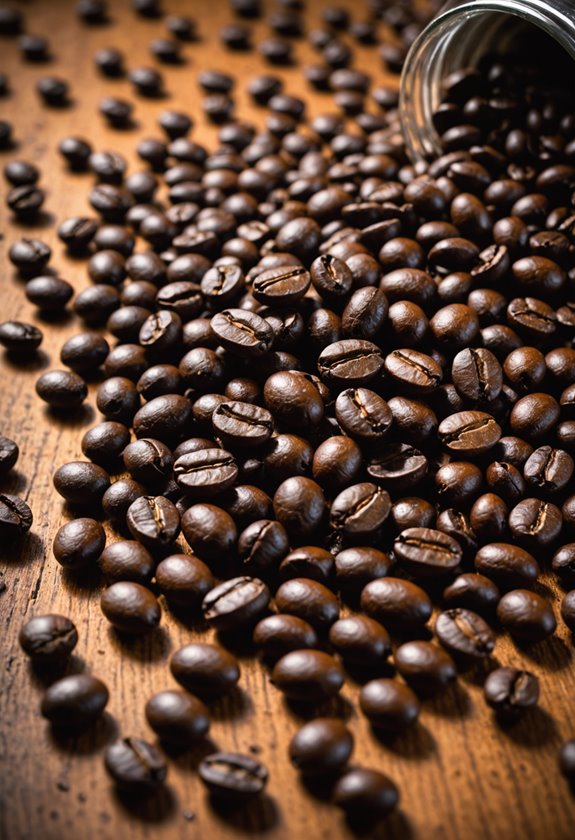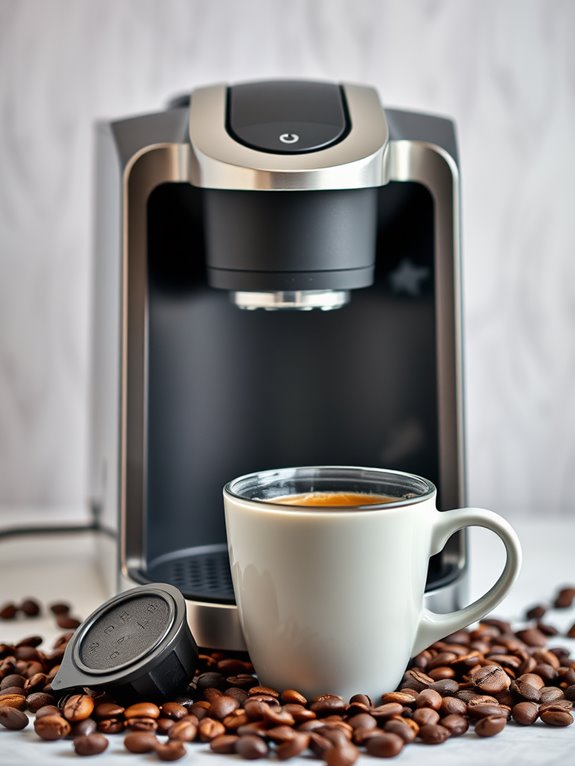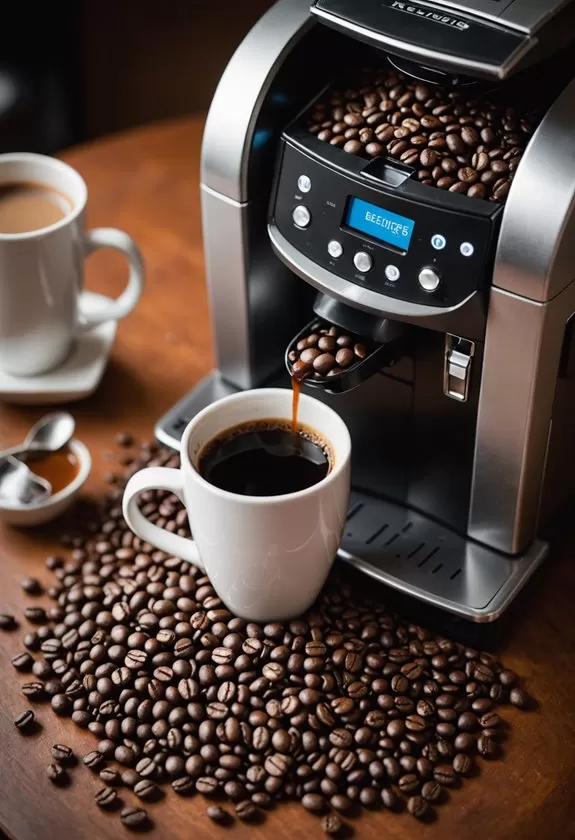Is It Safe to Eat Coffee Beans?
Let's investigate whether it's safe to eat coffee beans. Typically, consuming roasted coffee beans is safe, and they're actually quite nutritious. They're packed with antioxidants, like chlorogenic acids, benefiting your health by fighting oxidative stress. However, be cautious with caffeine; each bean has about 6 mg, so watch your overall intake. You should generally stay under 400 mg per day, equivalent to around 50 beans. Remember, raw green coffee beans can cause stomach issues for some people. If you have caffeine sensitivities or medical conditions, consult a healthcare professional. For more fascinating knowledge about coffee beans, continue on…
Key Takeaways
- Roasted coffee beans are generally safe and more palatable than raw green beans.
- Coffee beans contain antioxidants that offer health benefits, including potential cancer risk reduction.
- Each roasted coffee bean contains approximately 6 mg of caffeine, necessitating moderation.
- Consuming up to 50 coffee beans daily keeps caffeine intake within safe limits for most adults.
- Individuals with caffeine sensitivity should consult healthcare providers before consuming coffee beans.
Safety Considerations

When considering whether it's safe to eat coffee beans, it's important to recognize that they've been consumed safely for centuries. Early tribes even mixed them with animal fat for energy.
If you're curious about eating coffee beans, understanding their safety is essential. Let's examine this further.
Coffee Bean Types
Roasted coffee beans are generally safer and more enjoyable to eat than raw green beans. Roasting makes them softer and enhances their flavor, while green beans are hard and bitter. Some people experience gastrointestinal problems when consuming raw green coffee beans. Unlike pre-ground coffee beans, whole beans maintain their fresh flavor and aroma longer when stored properly.
Caffeine Content and Moderation****
Every roasted bean contains around 6 mg of caffeine. For healthy adults, keeping your daily caffeine intake under 400 mg is vital.
Eating too many beans can lead to digestive discomfort and other issues like heartburn due to their acidity and caffeine.
Health Conditions and Sensitivity
If you have health conditions or caffeine sensitivity, be cautious. It's wise to consult a healthcare provider before adding coffee beans to your diet.
Those with caffeine sensitivity might experience stronger effects from even small amounts.
Health Benefits
While considering the safety of eating coffee beans, it's also worth examining their health benefits. Coffee beans, especially when roasted, are packed with antioxidants like chlorogenic acids. These compounds offer anti-inflammatory properties and may lower the risk of chronic diseases, including heart disease and type 2 diabetes.
Green coffee beans contain chlorogenic acid compounds that may help regulate blood sugar levels and boost metabolism.
By eating roasted coffee beans, you can enjoy a quick caffeine lift, which can enhance your mood, cognitive function, and physical performance. Different roasting temperatures in convection ovens can affect the final flavor and caffeine content of the beans.
Let's investigate some specific benefits:
- Antioxidants: Coffee beans are rich in antioxidants, which help combat oxidative stress in your body.
- Caffeine Lift: Eating roasted coffee beans provides an immediate energy surge, perfect for those needing a quick pick-me-up.
- Low-Calorie Snack: They're a great option for a snack that's energizing yet low in calories, beneficial if consumed in moderation.
Additionally, the dietary fiber found in coffee beans supports healthy digestion by maintaining bowel regularity.
Furthermore, studies have shown that chlorogenic acids in coffee beans may have cancer-fighting properties, potentially reducing the risk of oral cancer by up to 50%.
If you choose chocolate-covered coffee beans, you'll also get a charming treat with these health perks. Enjoy these beans as a healthy part of your diet, but always remember to consume in moderation.
Caffeine Content

Although eating coffee beans can be a convenient way to get your caffeine fix, it's important to understand their caffeine content. A single roasted bean holds about 6 mg of caffeine, which is more concentrated than brewed coffee. This means that munching on these beans can lead to a quicker caffeine enhancement.
Robusta coffee beans contain nearly twice the caffeine of other varieties, making them a more potent choice for eating whole.
But, how many beans can you safely consume?
Safe Consumption and Daily Caffeine Intake
For safe consumption, consider your total caffeine intake. The average adult should aim to stay under 400 mg of caffeine per day. This equates to roughly 50 coffee beans.
Keep in mind that caffeine content can vary between bean types. Strong beans, for instance, generally have more caffeine compared to the milder Arabica beans.
Chocolate-Covered Coffee Beans
If you're indulging in chocolate-covered coffee beans, remember that each one contains about 12 mg of caffeine.
It's essential to monitor your total caffeine intake from all sources, especially when combining these treats with other caffeinated beverages or foods.
Consumption Methods
Coffee beans offer versatile consumption methods that cater to various tastes and preferences. You might enjoy eating whole coffee beans straight from the bag, as they provide a quick energy enhancement with their concentrated source of nutrients. It's safe to eat them, but be mindful of your caffeine intake.
If you're craving something sweet, chocolate-covered coffee beans could be your next favorite snack. They combine the rich flavor of roasted beans with the sweetness of chocolate, and you can even make them at home by coating roasted beans in melted dark chocolate, adding spices for an extra kick.
Let's examine some creative ways to incorporate coffee beans into your diet:
- Coffee-Rubbed Steak: Enhance your steak with the bold flavor of roasted beans.
- Choc Chip Coffee Cookies: Add ground coffee beans for a delicious twist.
- Slow-Baked Coffee Carrots: Try this unique dish for an adventurous culinary experience.
Whole beans, when ground, also make a flavorful addition to baked goods or as toppings for desserts, maintaining the nutritional benefits.
Alternatively, consider using coffee grounds in smoothies or other recipes for an energy enhancement. The possibilities are endless with these versatile beans!
Frequently Asked Questions
Is It Safe to Eat Raw Coffee Beans?
You're wondering if munching on raw coffee beans is safe. They're safe but tough and acidic. While they pack antioxidants, their taste and texture aren't great. Chewing them might cause digestive issues, so opt for roasted beans instead.
How Many Coffee Beans Can You Safely Eat?
You can safely eat about 10-15 coffee beans at a time, as this amount keeps your caffeine intake moderate. Exceeding this could lead to discomfort, so consult your healthcare provider if you're uncertain about your tolerance.
Can You Eat Straight up Coffee Beans?
You can definitely eat straight-up coffee beans. They provide a quick energy increase due to their caffeine content. Just remember to eat them in moderation to avoid potential digestive discomfort or caffeine-related side effects. Enjoy responsibly!
Can Humans Digest Whole Coffee Beans?
You can digest whole coffee beans, though raw ones are tougher. Roasted beans are easier and tastier. They offer nutrients and caffeine but eat them in moderation to avoid digestive issues like heartburn or diarrhea. Enjoy responsibly!







